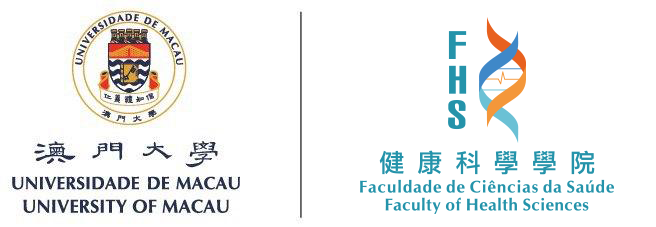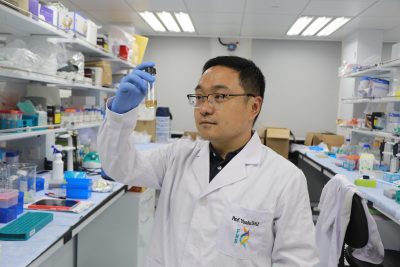Prof. Yunlu DAI, Associate Professor of the University of Macau(UM) Faculty of Health Sciences (FHS), is the recipient of the National Natural Science Foundation of China (NSFC) Excellent Young Scientists Fund (Hong Kong and Macao) with his project entitled “Metal-phenolic coordination biomaterials”. Prof. Dai is one of the only two awardees in Macao who receive the award in 2022, and the first awardee in FHS. He expects that his research can enhance the therapeutic efficacy of cancer treatments and provide new therapeutic strategies for cancer.
Consistent Attempts in Developing New Biomaterials
Cancer is a leading cause of death worldwide. The rise of immunotherapy has changed the traditional paradigm of cancer treatment in recent years. Polyphenolic materials are a class of phenolic compounds with multiple hydroxyl groups, which have excellent properties such as good biocompatibility, diverse pharmacological activities, and coordination with metals. Prof. Dai and his research team have been developing new metal-phenolic biomaterials using chemical synthesis from polyphenols with the aim to develop multi-functional polyphenol derivative modules that enhance the treatment of tumour. Prof. Dai’s research mainly focuses on multi-functional composite biomaterials for the targeted delivery of anti-cancer drugs. His research team designs and synthesizes metal-phenolic network (MPN)-based nano-biomaterials combinatorial cancer immunotherapy. In his previous studies, he has successfully developed a variety of new biomaterials that achieve excellent therapeutic results in vitro and in vivo studies, which implies that the phenolic materials are promising materials with a great research value.
Work Conscientiously with Commitment
Prof. Dai’s goal in translating his research into substantive contributions to the society is the driving force of his research work. “Although the biomaterials have shown the excellent value in treating tumour, they are still at the experimental stage. The safety of the materials to humans is still a key concern, including the toxicity, in vivo tolerance, metabolic rate, etc. Risk assessments to identify potential safety implications associated with the application of biomaterials in clinical application have to be conducted. There is still a long way to go.” Prof. Dai said. He insists in blazing a way through all manner of obstacles as he believes that perseverance is the formula for success.
The University and the Faculty Stand Firm Behind
When being asked about his receipt of the NSFC Excellent Young Scientists Fund, Prof. Dai is honoured to be awarded with the Fund, which is undoubtedly a great recognition of his scientific work. He is very grateful for the strong support from UM and FHS. Prof. Dai believes that platforms are crucial for researchers. By providing a wealth of research resources in terms of hardware and software, FHS has been supporting him to undertake research with dedicated commitment in a supportive environment, backing him up in achieving valuable research results. Since Prof. Dai joined FHS in 2018, he has made breakthroughs and ground break progresses in the field of biomaterials and nanomedicine. He has published 26 SCI papers as a corresponding author, including 24 Q1-ranked articles in Nature Communications, Journal of the American Chemical Society, Angewandte Chemie-International Edition, Advanced Materials, Advanced Functional Materials, Advanced Science, etc.
The NSFC excellent Young Scientists Fund is a national talent development programme which aims to support the research of young scientists with outstanding achievements, promote the growth of young scholars in science and technology, and cultivate leading scholars at the frontiers of science and technology in the world. Since 2019, the Fund has been extended to Hong Kong and Macao for applications by eight designated universities, namely Excellent Young Scientists Fund (Hong Kong and Macao). It is highly competitive as only 25 projects in total are funded across Hong Kong and Macao every year. A funding of RMB 2 million (approximately MOP 2.4 million) will be released for each project over a maximum period of three years, in the form of cross-border remittance to directly support the research work in Macao.


